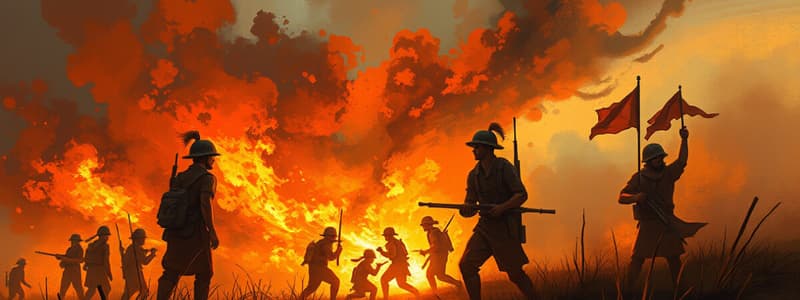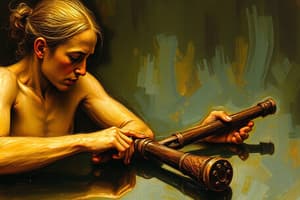Podcast
Questions and Answers
What is the role of the antagonist in a story?
What is the role of the antagonist in a story?
- To support the protagonist's goals
- To provide a backstory for the setting
- To resolve the climax of the plot
- To create conflict with opposing goals or beliefs (correct)
Which of the following conflicts involves a character struggling with an outside force such as a disaster?
Which of the following conflicts involves a character struggling with an outside force such as a disaster?
- Character vs. Society
- Character vs. Self
- Character vs. Nature (correct)
- Character vs. Character
Which type of writing specifically focuses on describing experiences during visits to different places?
Which type of writing specifically focuses on describing experiences during visits to different places?
- Travelogue (correct)
- Reflection Essays
- Testimonio
- True Narratives
What is the primary purpose of literary devices within a narrative?
What is the primary purpose of literary devices within a narrative?
In narrative structure, what happens during the denouement?
In narrative structure, what happens during the denouement?
What theme involves the interplay of personal acceptance and the challenges of understanding oneself?
What theme involves the interplay of personal acceptance and the challenges of understanding oneself?
Which type of literature is characterized by being written by the subject themselves and is based on personal experiences?
Which type of literature is characterized by being written by the subject themselves and is based on personal experiences?
What theme explores the idea of apocalyptic fear and instinctual survival?
What theme explores the idea of apocalyptic fear and instinctual survival?
Which theme centers around the increasing interconnectedness due to migration and cultural exchange?
Which theme centers around the increasing interconnectedness due to migration and cultural exchange?
Which theme is primarily a critique of societal structures and their impact on individual behavior?
Which theme is primarily a critique of societal structures and their impact on individual behavior?
Flashcards are hidden until you start studying
Study Notes
Common Literary Themes
- A literary theme serves as the main idea or underlying meaning, conveyed through various elements like characters, setting, dialogue, and plot.
- Struggle for Identity or Purpose: Explores themes of choice, self-acceptance, identity crisis, hiding one's identity, and unexpected identity twists.
- Effects of War, Terrorism, and Social Evils: Common contemporary literature topic addressing societal issues.
- Natural or Manmade Catastrophes: Focus on apocalyptic fears and human survival instincts.
- Personalized Narrative: Evokes empathy, curiosity, and responsibility, often found in nonfiction writing.
- Effects of Technology: Challenges readers' perceptions and broadens their understanding of reality.
- Effects of Capitalism: Reflects the economic framework that allows individuals to engage in business practices.
- Memory and History: Writers draw inspiration from the past to contextualize current events.
- Movement of People: Highlights experiences of interculturalism and globalization.
Types of Literature
- Biography: Objective narratives written by others in third person, based on thorough research.
- Autobiography: Subjective accounts written by individuals themselves in first person, rooted in personal experiences.
- Personal Narrative: First-person storytelling based on unique life experiences.
- Travelogue: Descriptive accounts of places visited, focusing on personal experiences during travels.
- Reflection Essays: Explore personal challenges or significant life experiences.
- True Narratives: Accurate recounting of specific events.
- Blogs: Regularly updated shorter articles on various subjects.
- Testimonio: Accounts emphasizing human rights issues, aiming to inspire action against trauma.
Literary Elements
- Character: Central doers in the narrative; includes dynamic characters (who evolve) and static characters (who remain unchanged).
- Protagonist: Main character of the story; often faces conflicts.
- Antagonist: Opposing character or force creating conflict.
- Conflicts: Central struggles motivating characters; leads to story climax. Types include:
- Character vs Character: Conflict between protagonist and antagonist with opposing goals.
- Character vs Society: Struggles against collective societal norms or groups.
- Character vs Nature: Survival from natural disasters or catastrophic events.
- Character vs Technology: Explores humanity's complex relationship with technological advancements.
- Character vs Fate: Involves struggles against supernatural forces or destiny.
- Character vs Self: Internal conflicts regarding choices and decisions.
Plot Structure
- Setting: Time and place where the story unfolds.
- Plot: Sequence of events and narrative arc.
- Exposition: Introduction and background setting of the story.
- Conflict: Central problems faced by the protagonist, categorized into major and minor conflicts.
- Rising Action: Events leading to the story's climax.
- Climax: Peak of the narrative where the main conflict is confronted.
- Falling Action: Events occurring after the climax leading towards conclusion.
- Denouement: The resolution or conclusion of the story.
Literary Devices
- Simile: A rhetorical device that makes comparisons using "like" or "as."
- Metaphor: Implicit comparisons between unrelated subjects, expressing that one is another.
- Symbolism: Using symbols to represent concepts, people, or events.
- Allegory: A narrative with dual meanings, where a surface story hides deeper meanings.
- Personification: Attributing human qualities to non-human entities.
- Hyperbole: Deliberate exaggeration for emphasis or effect.
Studying That Suits You
Use AI to generate personalized quizzes and flashcards to suit your learning preferences.




